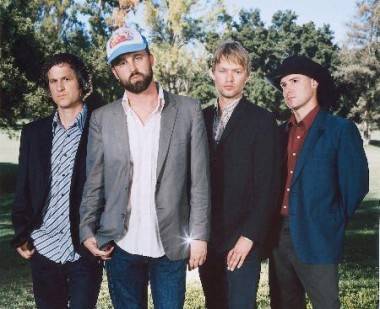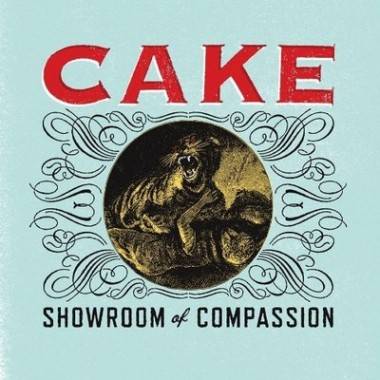Cake (‘Short Skirt/Long Jacket’) on their new album Showroom of Compassion
– by Jamielee Ong
Cake has been in the business of creating jaunty tunes for a little under 20 years, releasing album after album of tongue-in-cheek, blues-inspired music. Best known for scoring the theme song to the Chuck TV series as well as a 2010 Apple iPod Nano commercial, Cake has managed to achieve commercial success without sacrificing one iota of oddball credibility.
After a seven-year-long hiatus, the band passed through Vancouver on a tour celebrating the release of their seventh album, Showroom of Compassion, which debuted at number 1 in the Billboard Hot 200. Recorded in the band’s own solar-powered studio in Sacramento over a period of two years, Showroom of Compassion is consistent with the Cake identity – solid, simple, perfectly hummable arrangements surrounding vocalist John McCrea’s idiosyncratic poetry and delivery. It’s typical Cake, and most of the group’s long-time admirers will find nothing to their distaste.
We sat down with guitarist Xan McCurdy and trumpeter/keyboardist Vince DiFiore to hear about their move to self-production, life as a band, and the creative process in general.
Jamielee Ong: The way you deliver your sound is very “up front” – all the lyrics are enunciated, the sound is crisp, and I know you guys said that this was influenced by Frank Sinatra. How big of a component do you think this is to Cake’s identity or sound?
Xan McCurdy: I think maybe it’s pride in each of our parts, because we want everything to be heard.
Vince DiFiore: Yeah, the words are chosen carefully for the sound of the word, so John’s gonna follow that up with his good diction, with his pronunciation. Every sound of every word is there for a reason when John writes so it’s very clear. He doesn’t want to have any sounds going to waste so naturally it’s all enunciated. And with the parts, we kind of trade off on them. It’s usually not a sort of a huge sound that’s coming at you, a barrage of sound at once. It’s usually a changing off of melody and rhythm.
JO: Yeah, I can definitely see that. It even makes me think of spoken word, especially with you saying how the sound of the words are important. Would you go as far as saying it’s a form of spoken word?
VD: I don’t know, maybe, I’ve never seen John do his songs without music. So I don’t know if he’s interested in that. But certainly the music around the words is thoughtful to the words themselves. And you brought up Frank Sinatra, I think he’s somewhat of an influence in the phrasing of the lyrics and being able to decipher what’s being said. There’s kind of a cool thing with rock, especially with REM, you didn’t know what the hell Michael Stipe was saying but it was kind of interesting and cool. And so I think there’s a lot of that in rock where you’re not sure what the words are but it sounds so musical anyway. But that’s definitely not the direction that CAKE has ever gone. Do you think we should? Are we missing out on something?
JO: No, I think that’s something distinct in your sound, and that’s what I really like. I can actually understand the lyrics.
VD: I guess everything has to be intentional.
XM: I don’t think John has any reason to be embarrassed or shy about his lyrics. Maybe some young bands are like “Oh, I’m scared they’re gonna tease me about my silly lyrics.”
VD: Yeah, that is a good way to hide, through a lot of screaming or a lot of heavy electric music.
JO: I also wanted to ask you guys about switching ecord labels. You used to be with Capricorn, and then you signed with Columbia, and now you have your own record label [Upbeat]. Can you tell me about that whole experience from small to big to indie?
VD: I think we’re really grateful for everything that those labels were able to do. I mean Capricorn got us on the radio for the first time, and really promoted us. And then we got to the point with them when we weren’t sure where they were going, if they were going to continue as a label so it was risky to stay there. So we went with Columbia and there was diminishing returns because they were pretty much selling the album to people who would have bought it anyway. It wasn’t that we were expanding our audience that much. Maybe we did anyway but all that cost of having a label in a fancy building in NYC, they take a big percent of what you make so we decided to downsize and make sure that we were making albums that people who liked us in the first place would keep buying, and keep the overhead lower.
JO: So I know that you guys are the only band on Upbeat right now but are you planning on taking any new bands on the label soon?
XM: I think we’ll just stick with us for the time being. We’re enough headache. Who knows, maybe in the future, but not any time soon.
VD: Yeah, it would be horrible to be responsible for someone else’s career.
JO: Yeah, that would be a little scary.
VD: Yes, and have them be angry at you for the rest of your life because you signed away their own hopes.
XM: Yeah, they would have been stars if it wasn’t for goddamn Upbeat.
VD: There’s possibilities but right now our plate is full with the stuff Cake is putting out.
JO: How does being with an indie label reconcile with the fact that a lot of your work is going on pretty mainstream mediums?
VD: I never thought of us as an indie band. Since we have an independent label, I guess we technically are, but I always thought of indie bands as something that my female roommates would listen to that I didn’t like very much. Like really economical, sort of heart on your sleeve, really sweet voice, and very simple rhythm guitar. No good blues leads on the electric guitar, no fancy drumming. That’s what I think about indie music. Because there needed to be a label beyond alternative.
XM: The term “indie” doesn’t really mean the same thing it did 10, 15 years ago. I mean, isn’t REM on an indie label? It’s just where the business has gone, so many people are jumping ship as it doesn’t make a lot of sense to be on a major label. That’s just what we did, it’s not like we’re an indie band. Though I suppose it would have been fun to have that label if it did mean anything but it doesn’t… anymore.
JO: I actually find that really paradoxical in what were you saying about big bands jumping ship and doing their own thing because of the state of the industry. How you have to become independent in order to get your music out there.
VD: See I don’t think we could’ve branched out on our own as easily if we would have been with a major label. But I know there’s a band out there called The National that’s never been on a label. It’s just through the internet. All of a sudden they’re playing Radio City Music Hall.
JO: Yeah, they’re really big, they were just here a few months ago.
VD: Yeah, and their success was completely based on the Internet. So you can do it from the ground up.
XM: That’s the new indie indie. The nothing indie, with no label at all.
VD: Yeah, there’s sort of a way to describe music that’s never accurate enough, but necessary in order to talk about music. We sort of do what we do. With our first album we didn’t think we were an alternative band but we sort of fell under that category. I always just though of us as a rock band with a lot of different influences. We’re not metal, we’re not emo, we’re not adult contemporary, we’re not blues, we’re just a rock band and rock bands have always had a lot of different influences.
JO: Do you guys think that that shift is good? The shift of having to break away from major labels?
XM: I think it’s good for consumers. They have a lot of options on who they see and listen to.
VO: I think the music has become more honest too. When people were all gunning to be on a major label, the music was a little bit bigger and maybe that brought on more pretentiousness and more of a conventional rock sound that had always been on the radio before. Now people are being more honest on their sound. People are not aspiring to be rock stars anymore. That dream is sort of dead. That died with Aerosmith. Maybe it’s more about the music and less about the status of rockstardom.
JO: So let’s talk a bit about Showroom of Compassion now. You specifically said in a past interview that with Pressure Chief the method was more rhythm-based, a lot of the ideas came from the band. How would you say it was for this album?
VD: I think a lot of the ideas have always come from the band. We’ve just grown that much more this time. The ideas were that much better because we’ve matured as a band. Another thing I’ve heard was that the process was more democratic this time. I guess that was true. Then again it’s always been democratic. If anybody has a good idea, nobody’s going to reject something that sounds good. Perhaps John did lay back on making executive decisions until he really had to. When it came down to a stalemate after many weeks, the only way we were going to move on was if the songwriter would say “OK… let’s have it this way.” It just came down everybody’s contributions. That was how we finished the record. It was arduous.
Being in a studio, I guess I just enjoy playing live more? I guess I enjoy coming up with parts a lot… making arrangements for songs… I don’t really like the distillation process. I don’t like the editing process and competing with the other guys in the band for space on the songs is really unpleasant.
XM: It’s awful. It’s horrible. I hate it. I swear. It’s misery. It’s rewarding, sure. I get a feeling out of it at the end of the day that is a good feeling in a certain way. But did I enjoy myself? No. But it is very rewarding. And that is a good feeling. So it’s not all negativity… it’s sort of like looking at a house you just built and it was tough and you got you know… rusty…
VD: Oh you mean tetanus?
XM: Yeah you got tetanus but you got a house too.
VD: But the positive responses to the album make it all worthwhile. So I guess we did the right thing.
JO: I feel like each member played a big part. Like the vocals don’t really overcome the sound or the bass doesn’t overcome the vocals….
VD: That’s what happens when you have a hyperdemocratic process. Everyone’s bits are really… It’s almost like everyone’s bits are highlighted.
JO: But does that get frustrating? Does the hyperdemocratism compromise the music sometimes?
XM: Yeah that’s what I was talking about. That was hard but I think we did a pretty good job of making everyone happy. I think if you slowed things down… but I think the end result is because of our little bits of struggle and working and working, we can all go listen and say we all sound good and are represented well.
And that’s no small feat because sometimes I listen to a record and think “they must hate the singer there” because they were underrepresented. Maybe that bass player went to school to learn bass for 12 years and here he is going dong-dong… anyway, we’re getting into musicianship ego or something.
VD: I think we can kind of let go of that. Everybody’s pretty sure their parts are going to come through when it’s done. We’ve had the experience of listening to previous albums and a lot of times I have felt that that part of mine wasn’t really in the mix and then I’ll listen to the album and say, “It’s there.”
XM: When the magnifying glass is on you, things just go so hyper-blown out of proportion out of your mind. That’s why when the people ask you “how’s the record?” going you say “I don’t know.” You need to have some time spent and listen to it again. And I mean some time… like four months.
Another thing is that we’re not 18. This isn’t our first record where we have so much to prove to ourselves and everybody. We’ve put out a lot of albums. We see the rhythm of how long it takes and play a lot of shows. We just have less to prove, to brag, to show off.
JO: So what kind of statement does Showroom of Compassion make about Cake’s sound?
VD: I think it shows that we were able to build upon the strengths that we’ve had, things that have worked out in the past. Things like harmony vocals, we didn’t give up on that. We didn’t give up on trumpets, synthesizers, all the things that have worked on the past, we built up on this time. Maybe that’s the statement. That we’re confident that we have a good sound.
JO: So would you say that it was more of a refinement of your sound, rather than kind of turning the other way and redefining it?
XM: It shows we haven’t matured. (laughs)
VD: Every time we make an album, when we all come together it is a balance between doing your part as a band member, making sure everyone else sounds good, and realizing that your mortal coil is running out and your ability to make your mark on the world in some small ways is fleeting so… It’s a very similar process every time. But always new songs, and we have more experiences as a band. So that’s the final result that comes out of all of that.
JO: What do you ultimately want to achieve for your music?
VD: For reporters, I find myself interpreting John’s lyrics and his mission statement, however elusive that is, I find myself trying to interpret it and I find myself a little bit out of bounds doing it. One mission statement might be that things are maybe frail and messed up a little bit, but there is some hope. If you’re able to navigate through all the darkness, there’s a little bit of hope to enjoy life.
JO: That’s a good way of putting it.
VD: I guess that’s the way a lot of music that’s blues based that’s the message. That there is darkness in life but you can rise up above it.





One response to “Cake”